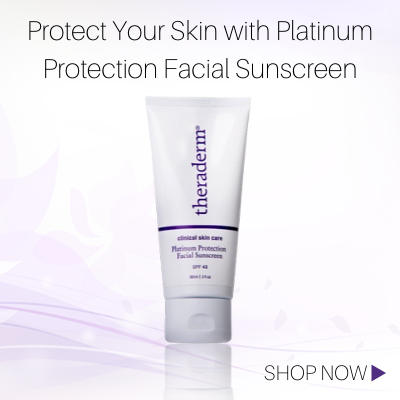Top 7 Reasons You Need Sunscreen in Winter
Slathering on sunscreen during the heat of summer makes perfect sense as nobody wants to end a day of fun on the lake or at the pool with a week of misery dealing with a painful sunburn. However, when it comes to spending time outdoors in the winter, people are less likely to remember protective sunscreen before they head out. Theraderm Clinical Skin Care founder and CEO, Dr. James Beckman, is a huge proponent of keeping skin protected with sunscreen all year round.
Here are his top 7 reasons it’s so important to apply your sunscreen in the winter:
1. The Ozone Layer is Thinnest in Winter
The stratosphere is a layer of protective gases that surround the earth. This protective layer of gases is referred to as the stratosphere because the gases are stratified (layered). Near the top of the stratosphere (furthest from the earth), is the ozone layer that absorbs and reflects the UV rays from the sun. Ozone production increases more quickly in warm temperatures and more slowly in cold. For this reason, the ozone layer is thinner at the earth’s poles where temperatures are very low, and the coverage is thinnest elsewhere around the globe during the colder winter months. That means even though the sun doesn’t feel as hot, you are actually exposed to greater intensity UV rays.
2. Even Indoor Lighting Can be Damaging to Skin
Shocking, right? Even if you’re not planning to go outdoors, new studies indicate that the light from computers, TVs, cellphone screens, and even lamps and other types of indoor lighting may be adding to skin damage. Daily application of sunscreen will protect your skin from damage caused by exposure to any light waves.
3. Snow and Ice Reflect Sunlight Which Intensifies UVA/UVB Rays
Just as water intensifies UVA/UVB rays from the sun; snow, and ice in the wintertime also increase the intensity of the sun’s rays and your risk for skin damage. If you’re planning to be outdoors sledding, skiing, or just taking a walk in the snow, applying sunscreen is very important. For adequate protection, select broad-spectrum sunscreens and lip balms with a minimum of 30 SPF.
4. Winter Weather Makes Sunscreen Wear off Faster Than Normal
Everyone knows that sweating, swimming, or spending time on sandy beaches in the heat of summer will make sunscreen come off more quickly. What most people don’t realize, is that harsh winter weather conditions will actually reduce sunscreen’s effectiveness just as quickly. Wind, snow, sleet, and the low temperatures themselves all combine to weaken sunscreen, so you’ll need to reapply frequently for optimal protection. Lunchtime is the perfect time for reapplication of your sunscreen in the winter months.
5. The Effects of Sun Exposure are Cumulative
New research and the publication of the findings of long term studies are revealing important information about the cumulative effects of sun exposure. It seems that the more time your skin is exposed to UVA/UVB rays over a lifetime, the greater your risk for skin cancer. Studies indicate that high levels of lifetime sun exposure are responsible for most cases of basal and squamous cell skin cancer.
6. You’re Actually Closer to the Sun
If you live in the Northern hemisphere, then you’re actually closer to the sun during the winter months. This may sound counterintuitive but it’s true. The Earth is farthest from the sun in July and closest to the sun in January! So, why does it get cold in the winter? The temperature drop is based on what direction the earth is tilting. The globe of the earth has two hemispheres (Northern and Southern). The U.S. is located in the northern hemisphere. When the northern hemisphere tilts away from the sun in the winter, temperatures go down. So, even though temperatures may be cooler in the winter, the entire planet is closer to the sun, causing more intense UVA/UVB rays that can adversely affect your skin.
7. Sunscreen Expires. Use it Before That Happens
Even though this shouldn’t be your only reason for wearing sunscreen in the winter, it’s certainly an added benefit. Most sunscreen begins to diminish in efficacy after just 12 months, so if you’re holding onto your tube of sunscreen to use next summer, you may find yourself getting burned more easily by the less effective sun protectant. Don’t hang on to that half-empty bottle of sunscreen until next summer. Use it up over the winter to keep your skin looking great.

